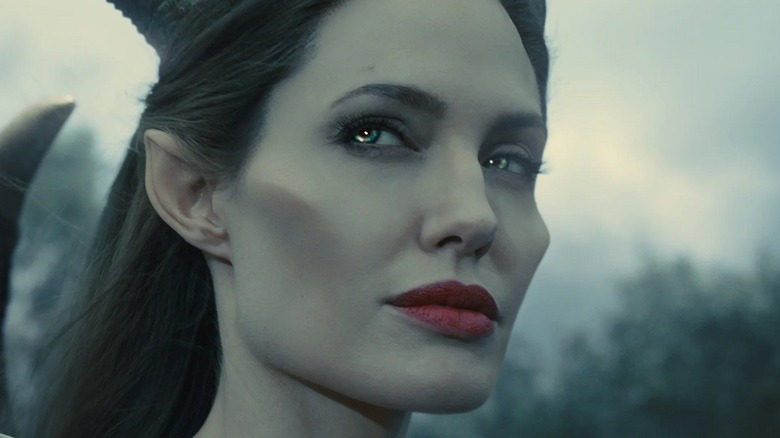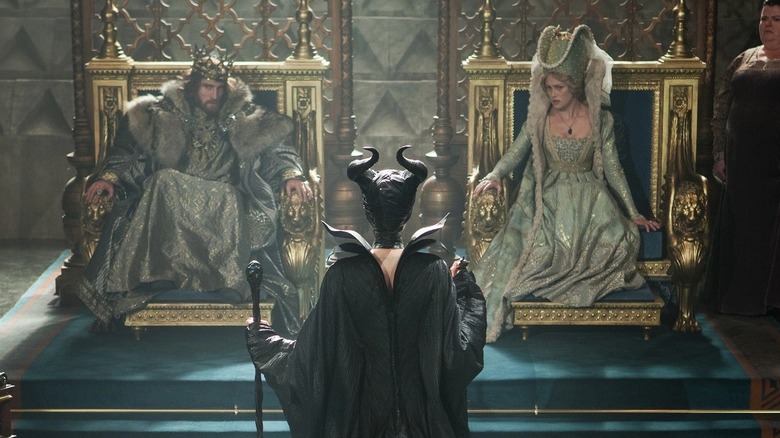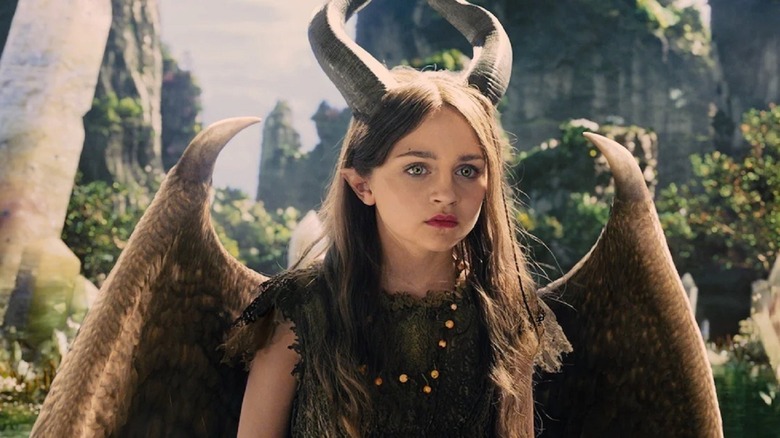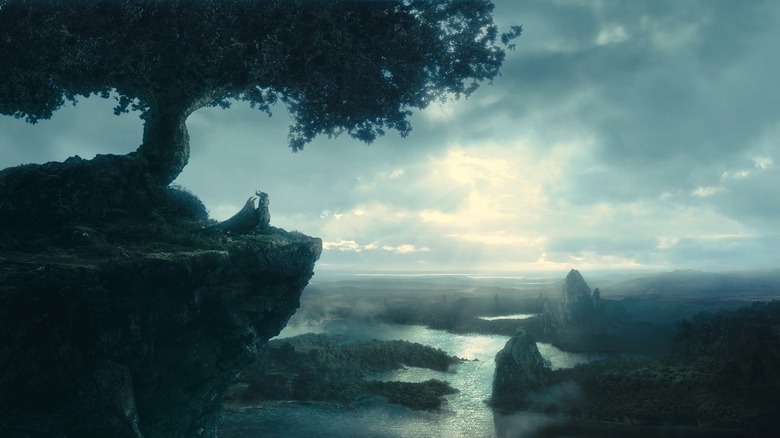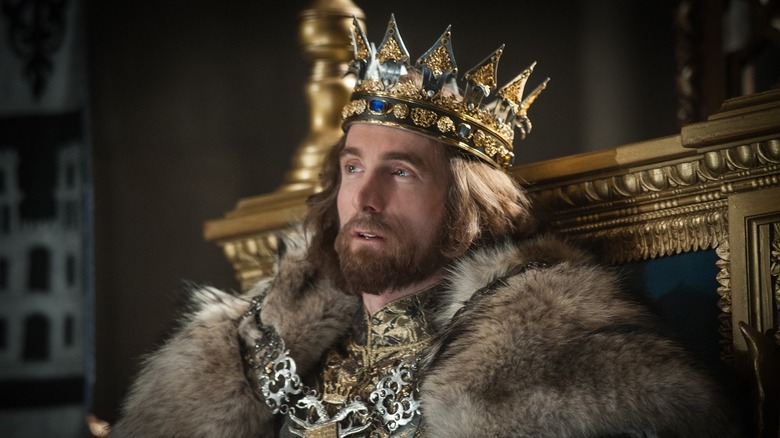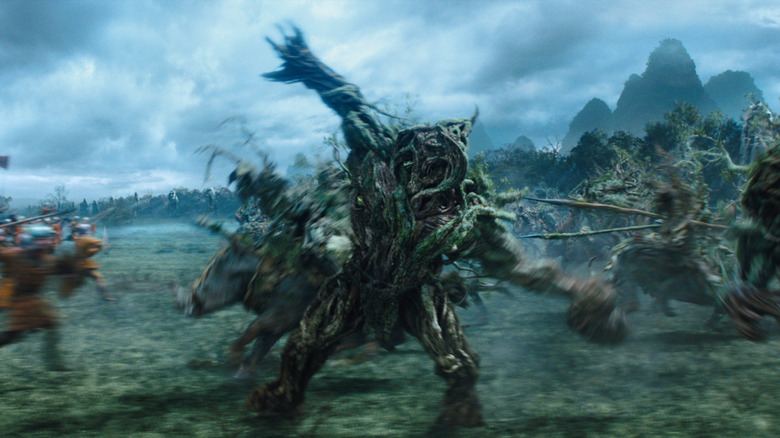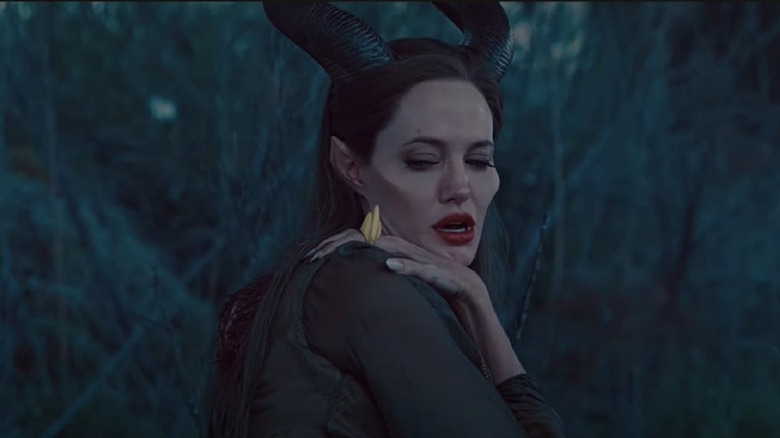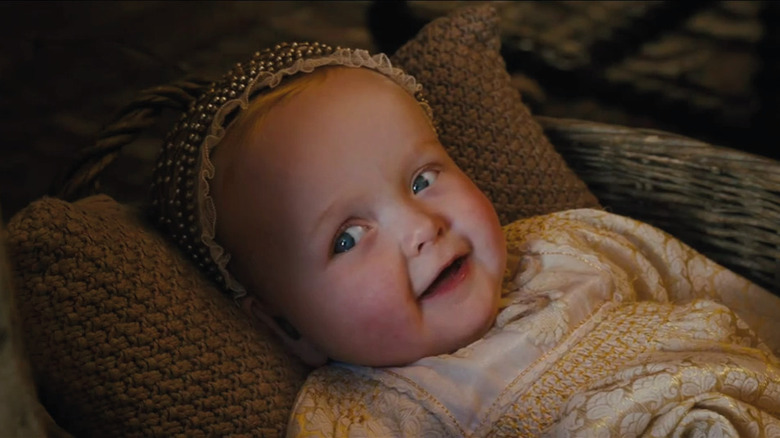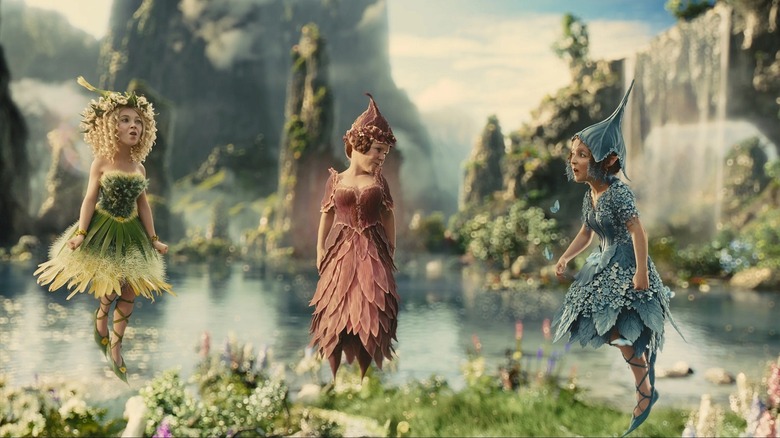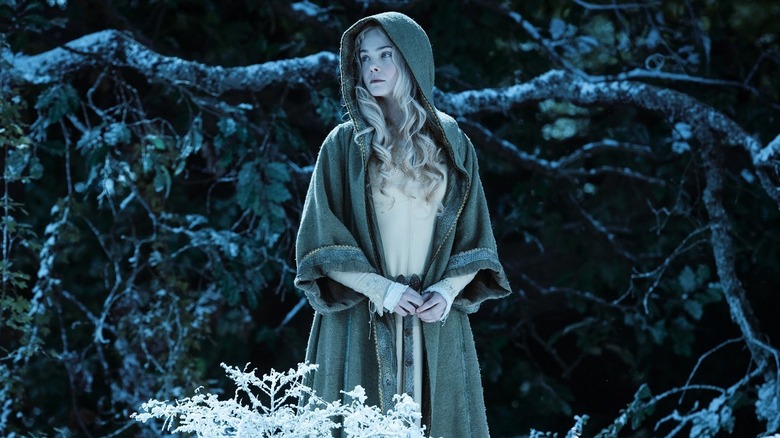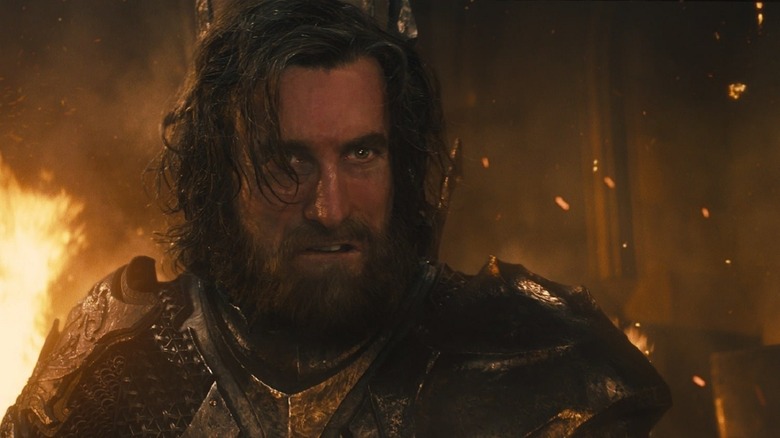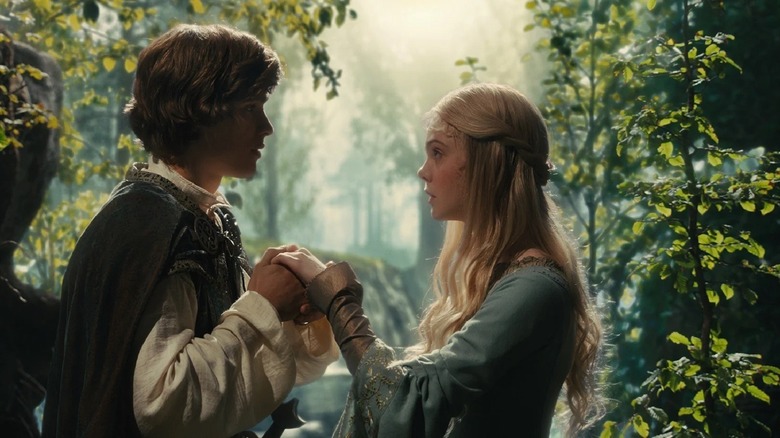Things Only Adults Notice In Maleficent
"Maleficent" arrived in theaters in 2014 to mixed reviews from critics, but significant praise from general audiences. It's also the only recent live-action Disney film to garner a sequel. Revisiting the film, it's easy to see why it managed to please audiences, particularly fans of the original "Sleeping Beauty."
Unlike the live-action remakes that Disney has been regularly producing for nearly the last decade, the story of "Maleficent" differs from the story of Disney's "Sleeping Beauty," and instead of focusing on Princess Aurora, centers on the villain of the original film, the titular Maleficent, played by Angelina Jolie. Instead of simply telling the same story in a new medium, "Maleficent" changes a number of significant plot points of the "Sleeping Beauty" story as we know it to offer something new, and often surprisingly emotionally powerful.
Many of these changes, and additions to the mythology of the world of "Sleeping Beauty," are noticeable to all audiences, but there are some things in the movie that aren't necessarily going to be legible to children. These vary from a number of surprisingly political plot points and allegories to references and jokes that make the movie richer for adult audiences. So let's take a look at some things only adults notice in "Maleficent." Spoilers ahead!
The movie is anti-monarchy
The film's opening narration, which sets the stage for everything that occurs, informs us that "there were two kingdoms that were the worst of neighbors." One kingdom was home to humans, "with a vain and greedy king to rule over them," and in "the other kingdom, the Moors, lived every manner of strange and wonderful creature, and they needed neither king nor queen but trusted in one another." This isn't just set up as a dichotomy of a people who are poorly ruled and a people who are happily self-governed, it also helps set the plot in motion as Stefan (Sharlto Copley), a young boy who befriends Maleficent, later betrays our heroine because of his greed and ambition and desire to become king.
When Maleficent, having been betrayed, takes a turn for the villainous, she creates a throne and crown for herself so that she may take ownership as queen of the Moors. She maintains this title until the end of the film, when things have been resolved and she is no longer angry or seeking revenge, and then abdicates the title. Aurora is crowned queen of the united kingdoms, but the majority of the film's portrait of monarchy as a form of government that inspires violent and greedy ambition, as well as the new social structure Maleficent imposes on the Moors when she becomes evil, indeed makes the movie read as intently anti-monarchy.
There's a significant racial allegory
As that opening narration sets up, there's a major difference between the inhabitants of the human kingdom and the inhabitants of the Moors. All of the people in the human kingdom are, well, human, while the inhabitants of the Moors are "every manner of strange and wonderful creature." That same opening narration also tells us that there was "vast...discord between" the kingdoms because the humans "were forever discontent and envious of the wealth and beauty of their neighbors."
The fact that the human kingdom is ruled by a greedy king while the people are envious of their neighboring kingdom reads as if the king has managed to divert the dissatisfaction of his subjects from his own greed, which certainly doesn't help them live well, and towards the inhabitants of the Moors. This plays out in more than simple envy though, as Stefan, during his first (uninvited) visit to the Moors as a child, calls the guardians of the border, huge humanoid tree creatures, "hideous to look at." So it's clear that the humans have been taught prejudice against the inhabitants of the Moors.
The racial allegory isn't hard to notice for adults who have a knowledge of real-world racism, and the ways that rulers have used it to divide people throughout history. But while it may not be clear to kids that's what's happening in the story, the general "don't be prejudiced" message of the movie is certain to reach them.
There's also a colonialism and environmental allegory
The greed of the human king and the envy of the people unsurprisingly leads the king and his army to attack the Moors early in the film. The narration tells us that the "human king heard of a growing power in the moors and he sought to strike it down," but the audience knows that there is no growing power, and certainly not anything resembling a threat to the human kingdom, it's an excuse to attack.
That attack fails, but it offers a moment where Maleficent screams at the king "you will not have the Moors," making clear the colonial allegory as the population of the Moors are attacked because of their resources. In a scene after the battle, King Henry says that when he ascended to the throne he promised his people that he would take the Moors and its treasures, clarifying even further that this plotline is a clear parallel for real-world colonialism.
Later in the movie, when Stefan has taken the throne, he attempts to burn the Moors, which adds an environmental layer to the story of the conflict. The humans, who also build up arms made of iron because it burns fairies, attempt to use the power of man-made flames to destroy the naturally beautiful and bountiful Moors because they fear the people who live there and because if they cannot control it, they would rather destroy it.
Stefan and Maleficent have dead parents, as is Disney tradition
Not all of the things only adults notice though are so politically and thematically heavy (though there are more heavy things to come), some of these things are simple and warrant a (undeniably somewhat morbid) chuckle. For instance, the fact that both Stefan and Maleficent say rather matter of factly to one another at their first meeting that their parents are dead, as is often Disney tradition for lead characters.
Dead parents are such a tradition for Disney that there are abundant think pieces on the phenomenon as well as many memes (of varying degrees of tastefulness). That the first moment of connection and having something in common for these two lead characters in a Disney movie is the fact that both of their parents have died can't go unnoticed by adults who have years of Disney movie watching behind them.
Not to be outdone by simply stating that Stefan and Maleficent's parents are dead, though, "Maleficent" also includes the death of Aurora's mother, and Stefan's wife, Leila (changed from Leah in the animated original and played by Hannah New), offscreen, and Stefan's death in the finale, leaving Aurora without any living biological parents by the end of the film.
The Bush Juggernaut looks a lot like the Balrog from Lord of the Rings
During the aforementioned battle with King Henry, Maleficent and the army of the forest defend their homeland against the attack. And some of the creatures that belong to the army of the forest, called Bush Juggernauts, look almost exactly like the Balrog from the "Lord of the Rings" — just without wings.
The Balrog, which the wizard Gandalf famously fights on the bridge of Khazad-dûm in the mines of Moria in "The Fellowship of the Ring," is a giant creature with even larger wings, horns that curve to outline its face, and a huge mouth that can open incredibly wide. When the army of the forest rises in "Maleficent," there's one close-up shot of a Bush Juggernaut rising from the dirt that clearly shows its design is an homage to the Balrog, and when we later see them in battle, we can see that they're basically the same creature (minus the Balrog's wings).
Add to this that the Bush Juggernauts and all the members of the army of the forest are giant creatures made of wood and leaves, so these creatures are basically Ents as well. It makes sense that "Maleficent," as a high fantasy film with a large-scale fantastical battle scene would pay homage to the most successful high fantasy franchise of all time, and it's fun that the film manages to make two references in one with the Bush Juggernauts.
Stefan stealing Maleficent's wings an allegory about assault
We see Maleficent and Stefan become friends as children and grow to be romantically involved in their teens but grew apart as they get older. Stefan becomes more ambitious and seeks to garner favor with King Henry so he can become a noble or even king himself. So he stops visiting Maleficent and the Moors. When, after his failed attack on the Moors, King Henry says whoever kills Maleficent will be named his successor, Stefan takes action.
He meets Maleficent after many years apart and after hours of talking, reminiscing, and seeming to feel real joy at their reunion, Stefan drugs her so that she falls into a deep sleep. He pulls a dagger with the intent of killing her, but he cannot go through with it and instead opts to cut off her magnificent wings and show them to King Henry as proof of her demise.
When Maleficent wakes up and slowly realizes that Stefan has stolen her wings, Angelina Jolie's performance is incredibly powerful as she wails in great pain. It's a potent scene, and not just because of Jolie's performance. Maleficent's wings were taken without her consent, and this happens after she's drugged by someone she once romantically loved. It's a brutal chain of events that is impossible for adults not to read as an allegory for real-life assault.
If you or anyone you know has been a victim of sexual assault, help is available. Visit the Rape, Abuse & Incest National Network website or contact RAINN's National Helpline at 1-800-656-HOPE (4673).
A christening in a fantasy world makes no sense
On a much lighter and somewhat nitpicky note, at one point in "Maleficent," after our title character has been betrayed by Stefan and is considering how she might take revenge, her loyal servant Diaval (Sam Riley) informs her that Stefan has had a baby and there is to be a "christening." As many adults and few children are likely to know, "christening" is a specific term that refers to a Christian naming ceremony during which a baby is baptized and given a "Christian name" (aka a first name). So we can't help but wonder why this term is used in a movie that takes place in a fantasy world that seems to have no signs of Christianity (or any religions for that matter) existing.
Sure "christen" has come to be used secularly and in more informal settings, people are often "christened" a nickname, but in the context of a seemingly medieval high fantasy movie, it's hard not to think of the Christian meaning especially when it's in reference to a ceremony held for a baby. It's not so much a problem as it is an interesting question, while only adults will notice that it doesn't make sense in this fantasy world, it's also likely that only adults will know the meaning of the word, why didn't the movie simply have Diaval say "a naming ceremony"?
There's a multilayered witch joke
After Maleficent crashes the aforementioned christening and places a curse on baby Aurora, Stefan orders the three "good" (in quotes because according to "Maleficent," Maleficent is also good) fairies, Knotgrass (Imelda Staunton, who many will recognize for her role as Dolores Umbridge in the "Harry Potter" movies), Thistlewit (Juno Temple), and Flittle (Lesley Manville) to take Aurora into a cottage in the woods and raise her so that she stays safe.
The fairies do exactly that, but they are concerned that the fact that they are tiny flying creatures might cause suspicion, so they transform into human-appearing women. After their transformation Knotgrass says: "There will be no questions asked. We are no longer fairies. We are three peasant women raising our orphan child in the woods."
This works as a joke about lesbians, polyamory, and old suspicions about witches. A group of women raising a child together would certainly raise eyebrows in any medieval period, and today might be less judgmentally looked upon as a group of romantically involved women raising a child. Beyond the polyamorous lesbian joke, though, there's the addition that these women live in the woods, the stereotypical living place of witches, according to old rumor and media representation at least. It's a joke that works on a lot of levels to any adults who can understand each of these levels, but likely doesn't even register as a joke to children watching.
It's a classic sins of the father story
Much like both Stefan and Maleficent's parents being dead, the center of the story (which is also the center of the original "Sleeping Beauty" story) in "Maleficent" is a plot point that many adults are likely familiar with but may still feel new to children: the cursing of Aurora to punish Stefan. The revenge for a parent's actions being visited upon their children is an extremely common plot point in a variety of media, and the trope's name, "sins of the father" or "sins of our fathers" goes all the way back to the Bible.
What makes "Maleficent" more interesting is the fact that as the film goes on, as Aurora grows older she and Maleficent bond, and Maleficent decides that she wants to revoke the curse. She does not want to punish the innocent Aurora for the violence and cruelty of her father and in a moment of great emotion attempts and fails to remove the curse. When she placed the curse, she said that no power could remove it, which means even she cannot remove it, and we see how much it pains Maleficent to have created a punishment for a child because of the evil of her parent.
Stefan's paranoia is reminiscent of Macbeth's
After Stefan becomes king by evil means and the curse is placed upon his daughter who he sends away, he grows increasingly paranoid about having left Maleficent alive and what other attacks on him she may be planning. When Queen Leila is dying, he is too concentrated on his fears to attend to his wife and say goodbye, and shortly thereafter he insists that the ironworkers in the kingdom be working at all times, including the "wee hours" of the night.
Sharlto Copley brings this all-encompassing paranoia to life with a sweaty and jittery performance that brings to mind another king who ascended to the throne by immoral action: Macbeth. In "Macbeth," as many adults and few children who haven't yet been through high school will know, the titular Macbeth kills the king so that he can take the throne but falls prey to paranoia leading him to more and more violence, and ultimately his downfall.
While Stefan did not kill the previous king, he certainly committed an evil act so that he could ascend to the throne and his descent into paranoia about Maleficent drives him to instigate a battle with her that costs him his life. It's not the most complex reference, and to find an entire portion of the plot of a Disney movie drawing on Shakespeare certainly isn't new, but it's a fun note that adult viewers can pick up on.
An updated conversation about the issue of consent
As the story goes, the princess has fallen into a deathlike sleep and can only be rescued by "true love's kiss," and in the classical versions of the story, that comes in the form of a prince who is confident in his choice to kiss the princess. But in "Maleficent," the scene of Prince Phillip (Brenton Thwaites) kissing the sleeping Aurora plays out very differently.
First, he doesn't fight his way into the castle and is instead brought to the sleeping princess's door by Maleficent. Then, Phillip doesn't "feel right" about kissing the sleeping girl. The fairies urge him to kiss her, assuring him that she's under an enchantment and his kiss can save her, but he says while she is beautiful and he wants to kiss her, it wouldn't be right to kiss a sleeping girl that he barely knows and only met once.
While he ultimately bows to the pressure and kisses her (which does not break the curse), this exchange between the young prince and the fairies serves a dual purpose: Phillip's reluctance shows an updated understanding of consent on his part, and it's a critique of the "love at first sight" trope, which is even name-dropped by the fairies.
It's a funny and intelligent scene made even better by the fact that Maleficent's apologetic kiss is the one that breaks the curse. "True love" isn't romantic, here; it's the bond between Aurora and her surrogate mother.
